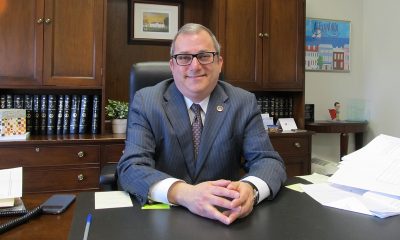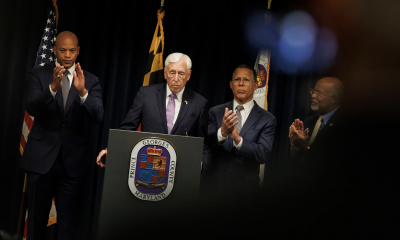Opinions
Gay men talking about mental health
Why don’t we take it as seriously as physical fitness?
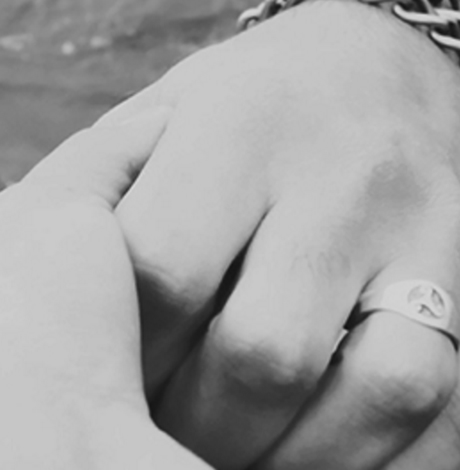
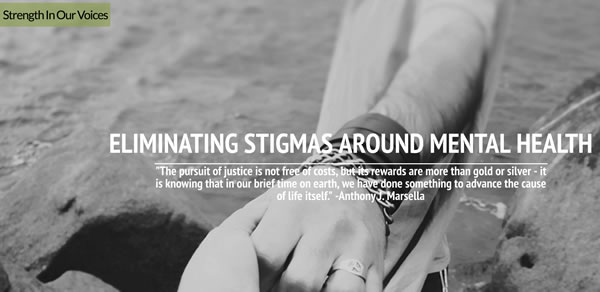 I’ve always found it interesting and amusing that as gay kids we did pretty much anything we could to get out of gym, but as gay adults we more or less flock to them. I remember in sixth grade being terrified of Coach Whitmore and this terrible, sadistic game he invented called “crab soccer.”
I’ve always found it interesting and amusing that as gay kids we did pretty much anything we could to get out of gym, but as gay adults we more or less flock to them. I remember in sixth grade being terrified of Coach Whitmore and this terrible, sadistic game he invented called “crab soccer.”
That was then. And I’m sure most of us had Coach Whitmore in our childhoods. But now many us can’t imagine gay city life without the gym. For various reasons best explored in other columns, gay men put a huge premium on their physical state. Naturally, we want to look good, and feel good, but why does it seem that when it comes to our mental health, many of us don’t seem to invest as much?
I was wondering about this issue — gay men and mental health — so I grabbed my friend Bobby, who last year started his own organization, Strength in Our Voices, with a mission to provide support for people impacted by mental health issues. We sat down a few Sundays ago in Larry’s Lounge. Here’s what he had to stay:
Tell me more about Strength in Our Voices
SiOV is a mental health non-profit dedicated to eliminating stigmas surrounding mental health. Our mission is to create an environment of trust and support for those impacted by mental health issues through open dialogue, education, empowerment, and positive change. As a group, we are individuals that have either experienced mental health issues firsthand or truly believe in the cause of eliminating stigmas so that we can all live in a more understanding world. We hope to use the power of social media and storytelling to bring insights to our community. Additionally, we host events not only to raise money but also to bring the community together to talk about mental health stigma.
What has SiOV been up to lately?
This past spring, SiOV hosted its first “Summer of Strength Benefit for Change” in D.C. where we raised more than $16,000. With these proceeds we are bringing Sources of Strength, a permanent, comprehensive suicide prevention program, to McLean High School in Fairfax County, a region that has witnessed high rates of teen suicide in recent years. We are facilitating the program build out at McLean this fall
Why is mental health important to you?
I’ve gone through so much in my own life. From being bullied during middle and high school to the process of coming out in college. More recently, I struggle with anxiety on a daily basis and regularly see a therapist to work on stress reduction.
I know that talking about the issues I’ve experienced has been the most important action I’ve ever taken to improve my own health. If I had found a platform or comfort with which to do so sooner in my life, I wouldn’t have had to suffer alone as long as I did. I hope to be able to touch lives so that someone out there might feel like they are not alone, and even find it in themselves to seek help through a friend, family, or medical professional.
What issues surrounding mental health are of particular importance to gay men?
Generally, LGBTQ individuals are three times more likely than others to experience a mental health condition such as major depression or generalized anxiety disorder. Additionally, gay men experience identity issues, post-traumatic stress disorder, suicide ideation, substance abuse and body dysmorphia, among others.
In my opinion, I think that the mental health issues gay men face originate from two primary sources: societal expectations and the gay social scene.
There’s a dynamic between gay men and heterosexual/religious communities. That is, there’s a sense of wanting to remain acceptable within the eyes of a majority that had recently rejected us. This may be changing as younger generations enter into adulthood. However, I do feel as if many of us expect to face homophobia or discrimination at some point. Whether this makes us sensitive, defensive or want to seem impressive, I’m not sure. But there’s something there that has an effect on our mental health.
Regarding the gay community, we live in a hypersexualized, active community that is both vain and self-loathing. One on hand, we are accepting of differences, but on the other hand, we are body shaming, judgmental critics – mostly of ourselves. Social media self-affirmation is common; we are constantly bombarded by shirtless selfies. Body dysmorphia is a huge issue in the gay community as a result. We are also a close-knit, extremely social, but small community which makes gay men both competitive and cliquey. I think that the concept of being a fabulous, multi-faceted, A-type gay who throws perfect dinner parties is something that plagues much of the gay community. We constantly size ourselves up to other gay men. Additionally, we tend to interact with a number of gay men, but we aren’t particularly close with a majority of them (it’s simply not possible to be close friends with that many people). As a result, we know everyone, but we don’t really know everyone; judgment and gossip fills the gaps.
Is the stigma surrounding mental health more or less so in the gay community?
I think it’s useful to distinguish between stigma and “self stigma.” Stigma is a mark of disgrace associated with a particular circumstance, quality, or person (i.e. simply, a negative stereotype). “Self stigma” is the internalization of negative beliefs.
Mental health stigma in the gay community is both more and less pervasive. On one end, gay men tend to be more open and accepting of feelings, issues, differences, and hardship than their heterosexual counterparts. At the end of the day, we recognize that our experiences are quite similar and tend to talk more freely with each other about those experiences.
However, on the other end, we can be dramatic, shallow, judgmental, gossip-folk in an incredibly social community, which leads to more “self stigma.” I believe that many gay men think regularly about judgment, being stereotyped by other gay men, and being accepted by different cliques within the gay community.
Where do you hope to take SiOV?
I certainly hope to be able to raise more money to bring useful programs to the community. I also hope to be able to dig into the many specific mental health issues we all face, ones that may seem relatively mundane, and share detailed stories on those issues so that new perspectives are illuminated. Maybe you learn something new. Maybe you simply find that the information resonates. Ultimately, if we understood how similar we really are, we will not only treat each other differently, but also, we will treat our own selves differently.
Bobby and I both felt it necessary to state that neither of us are professionals when it comes to mental health. If you find yourself needing assistance, contact either SiOV or the myriad other community resources available such as Whitman-Walker Health.
Brock Thompson is a D.C.-based freelancer writer. He writes regularly for the Blade.
Opinions
In favor of healthcare for trans youth
Denying teenagers puberty blockers is a human rights offense

One of the hottest issues in America right now is that of gender affirming care for trans youth. Even people close to me — as close as parents and siblings and dear friends — voice their disapproval of letting trans or nonbinary adolescents (and those who are younger) receive appropriate healthcare in the form of puberty blockers and other medicines to prevent their original gender from onset, and instead establish a new gender that they feel comfortable in. This is a topic that I believe is highly contested among Democrats themselves, so I have taken extra time, patience, and detail to write this article. Out of all of the op-eds I have penned for the Blade, this is the one I have most prepared for.
Trans youth should be able to access quality gender affirming care. Denying these children and teenagers puberty blockers is a human rights offense.
Many older trans people in the current day report feeling “off” about their gender from a young age. The majority of us, myself included, didn’t have a vocabulary to describe our feelings, so we instead lived teenage years under this strange angst — this strange anxiety about our bodies that we couldn’t put a name to. Maybe a lucky few of us grew up in Manhattan, or some other elite coastal city, and were, for instance, raised by lesbian moms or gay fathers or were put into some scenario in which we had access to vocabulary such as “gender dysphoria,” “cisgender,” and “transgender.” I’ve only known one person who had this vocabulary handed to them, but they were intersex, so questions about their genitalia were asked from a young age. Other than that, the point is this: Many transgender people feel like something was wrong during childhood. And here is the other point to be made: Many youth in the current day feel that something is wrong. The difference now is that modern day youth have access to more puberty blockers, more hormones, and more grown ups who want the best for them, in addition to more evil and cruel grown ups who don’t.
Youth who are genuinely transgender — who will likely live the rest of their life as a new gender — are in so much pain that they often want to kill themselves. These kids, be they seven, eight, 11, or 13 years old, engage in extremely unhealthy thoughts about their bodies and lives. Doctors will see signs of suicidality from the get go: the kid might exhibit parasuicidal behavior, such as scratching their arm with a razor, they might think of jumping off of a building, and they generally will not want to wake up the next day to confront the bullies who will tease them about their hair, clothes, and identity. Opponents of gender affirming care for youth often don’t understand the wrath that gender dysphoria places on its beholder: they don’t understand how depressed, anxious, and overall terrorized these kids feel. They perhaps just think that these kids can live a normal adolescence, maybe cross dress on occasion, and wait to fix their bodies until they are of “sane” and “healthy” mind. But I want to ask parents out there if they really feel as if children and teenagers who are suicidal is healthy: Do you think that a boy who wants to be a girl but can’t is going to bed feeling happy? The answer is no.
It is totally unhealthy for trans youth not to be able to delay their puberty. It is unhealthy for them to have to sit and stew in this wretched, cruel, and twisted universe that scorns their label of a new gender. It is unhealthy for them to turn on CNN and watch as Marjorie Taylor Greene or the president of the United States calls them monsters, or says that they are somehow sick.
Don’t get me wrong — it is appropriate and necessary for these gender nonconforming youth to be screened by doctors. They should be vetted by psychiatrists, psychologists, primary care physicians, endocrinologists, and licensed social workers. A rigorous and intelligent process for evaluating their dysphoria and alleviating their symptoms should be in place. What they are experiencing, after all, is not healthy.
What is healthy is giving these youth access to a new channel of freedom — healthcare that makes their bodies more aligned with their minds and healthcare that will cause them to be less suicidal, and more in touch with their surroundings and school environment. These youth deserve a chance at life–a shot at success. They deserve to learn in schools where their teachers don’t get punished for asking for preferred pronouns. Boys deserve to wear dresses and girls deserve to cut their hair short. The world needs to relax about gender. We are the ones suffering, not you. We are the ones bearing the brunt of cruelty. Let us have healthcare when healthcare is appropriate.
Isaac Amend is a writer based in the D.C. area. He is a transgender man and was featured in National Geographic’s ‘Gender Revolution’ documentary. He serves on the board of the LGBT Democrats of Virginia. Contact him on Instagram at @isaacamend
Opinions
Team Rayceen’s hiatus is officially over
Reflecting on a dark year while looking forward to 2026
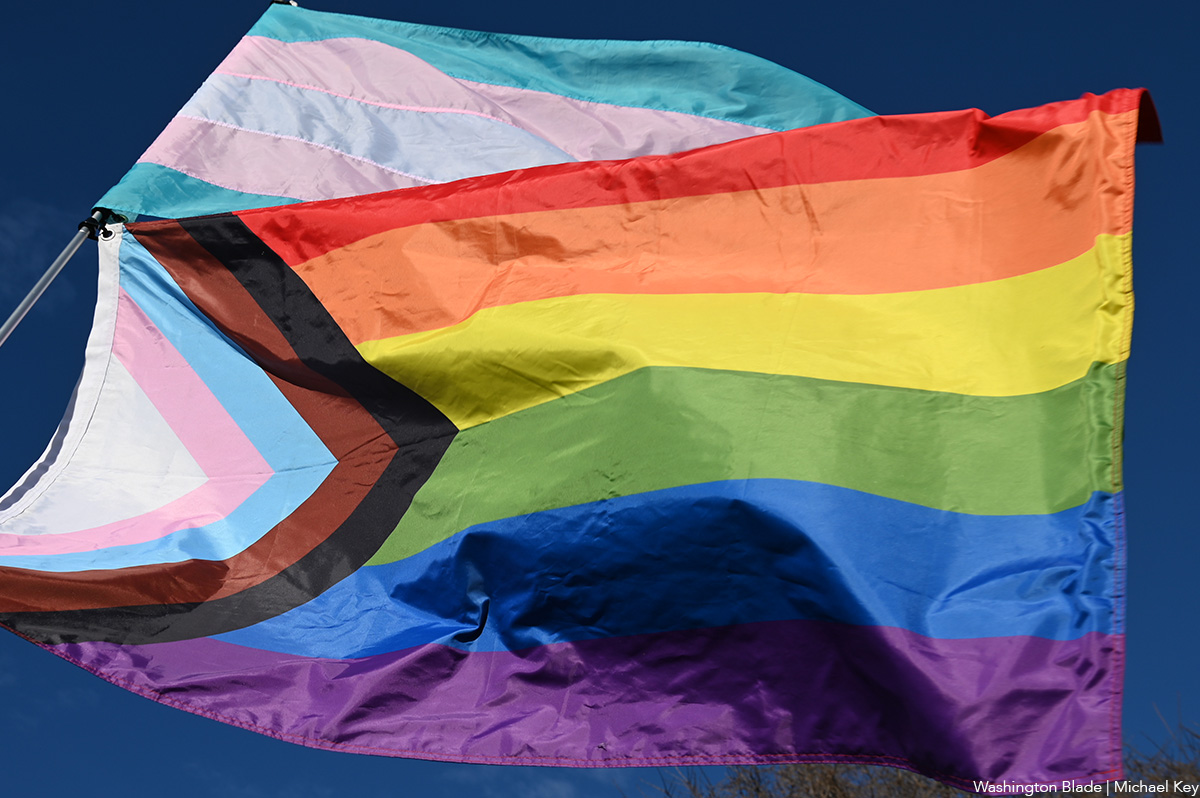
In 2026, many will analyze the last 12 years because Mayor Bowser’s administration will conclude at the end of her current third term. My focus on this time frame is that as of 2026, Team Rayceen Productions will have existed for a dozen years. We have been through six primary elections, five pivotal production faux pas, four personnel problems, three presidents, two presidential impeachments, and a pandemic — and we’re still here.
Although our mantra is that we are For the People, TRP (Team Rayceen Productions) is essentially a one-man band. While Rayceen Pendarvis is a renowned emcee and revered community leader, and TRP has talented co-hosts and cherished volunteers, administratively and creatively, from invoices and graphics to selecting guests for interviews or performers for events, I run the show. This can be daunting, as it is for the numerous volunteers and staff members with many community groups and local LGBTQ organizations that take on multiple responsibilities while struggling with limited funding, resources, and institutional support.
After my sense of disappointment (but not shock or surprise) at the results of the 2024 presidential election, I abandoned my dreams and plans for TRP under a Harris administration and activated Plan B: stepping back from my creative duties and letting the annual TRP winter hiatus continue indefinitely. I correctly predicted that events would be cancelled, funding would become unavailable, and that overall, 2025 would be bleak.
Halting work on the Team Rayceen YouTube channel caused me to realize that this one aspect of my responsibilities was essentially an unpaid full-time job, especially during election years, due to our numerous candidate interviews. I was producer, director, editor, and booking agent; I did everything except interview guests on camera. Those five years of creating videos and live streams were exhausting. With that not happening, I had the unfamiliar experience of having free time in 2025. Within 10 months, I read more books than I had in the past 10 years.
Throughout the year, I continued my duties not only as TRP administrator and archivist, I also remained Rayceen’s de facto manager, agent, publicist, and speechwriter. By summer, somewhat reluctantly, I had resumed some of my TRP creative duties when collaborations with Arena Stage were offered. In the autumn, TRP also returned for Art All Night Shaw and organized an LGBTQ town hall.
Moving forward, I have decided to recalibrate my TRP roles. Our hiatus is officially over, and now we are prioritizing collaborations and supporting other organizations. I am calling it the Team Rayceen Agenda for Community Engagement, the acronym being T.R.A.C.E., our outline of priorities for the New Year.
These are our current priorities within the LGBTQ community:
• Increasing and improving communication and collaboration among LGBTQ organizations and groups, including those that are new and smaller
• Honoring LGBTQ elders
• Increasing and strengthening intergenerational bonds among LGBTQ people
• Welcoming and engaging with local LGBTQ community members who are new to their identities, the geographic region, or adulthood
• Creating databases for booking local LGBTQ performers, DJs, and photographers
We hope to partner with an array of organizations for these agenda items:
• Increasing voter registration, education, and participation
• Informing voters about the candidates, as well as proposed legislation and ballot measures, including via community listening sessions and candidate debates, forums, and interviews
• Creating events that are inclusive and foster LGBTQ allyship and finding ways to cultivate allyship, with an emphasis on trans people
• Organizing efforts to unify various demographic groups, including Black and API communities, and creating opportunities to dialogue, socialize, and collaborate
• Creating new local awards that honor and acknowledge elders, young people, performers, content creators, and event organizers
My advocacy for Rayceen Pendarvis will also continue:
• More hosting and emcee bookings
• Acting roles and cameo appearances in films, TV series, web series, commercials, and music videos
• Music recording opportunities as a featured or backing vocalist
(If interested in anything listed above, please email us.)
I have hope that these things are achievable and that if we can bring the right people together, action could happen soon. I think people in the region are ready for change: not only is The National LGBTQ Task Force’s Creating Change Conference in D.C. this year, but the board of Capital Pride Alliance (CPA) has new leadership; capable people have become staff members at CPA, the Mayor’s Office of LGBTQ Affairs, and elsewhere; and qualified people are running for positions to lead or represent D.C. residents, in races that are open or competitive.
For those reasons, I feel that perhaps D.C., including its LGBTQ community, is not going to be a kakistocracy, plutocracy, oligarchy, and/or gerontocracy. I am less certain about the federal government. We shall see how much beyond 12 years TRP lasts and how much beyond 250 years the USA lasts, if indeed, during this fascist regime, the latter currently exists in any meaningful way.
I’ve been through nearly 12 years of Team Rayceen Productions. This includes organizing numerous special events, such as two Black History Month programs and two town hall discussions. We convened three online At-Large Councilmember Candidate Forums in 2020. We produced Rayceen’s Reading Room for D.C. Public Library for four consecutive years. We produced four variety shows for Artomatic. We have been involved with both Silver Pride and the defunct OutWrite LGBTQ Literary Festival for five years. We have assisted with District of Pride for six years. We produced seven Art All Night programs and partnered with Story District for seven years of the annual Out/Spoken event. We produced the final eight seasons of “The Ask Rayceen Show” (2012-2021) and 10 social mixers (Rayceen, Fix Me Up!). We created multiple live stream series and more than 900 YouTube videos. All without a big financier. C’est la vie.
Most remarkably, I got through all of last year, and I’m still here.
Zar is the mononymous founder of Team Rayceen Productions, community advocate, consultant, songwriter, and lifelong resident of the Capital region.
Opinions
Support the Blade as mainstream media bend the knee for Trump
From CBS to Washington Post, MAGA taking over messaging
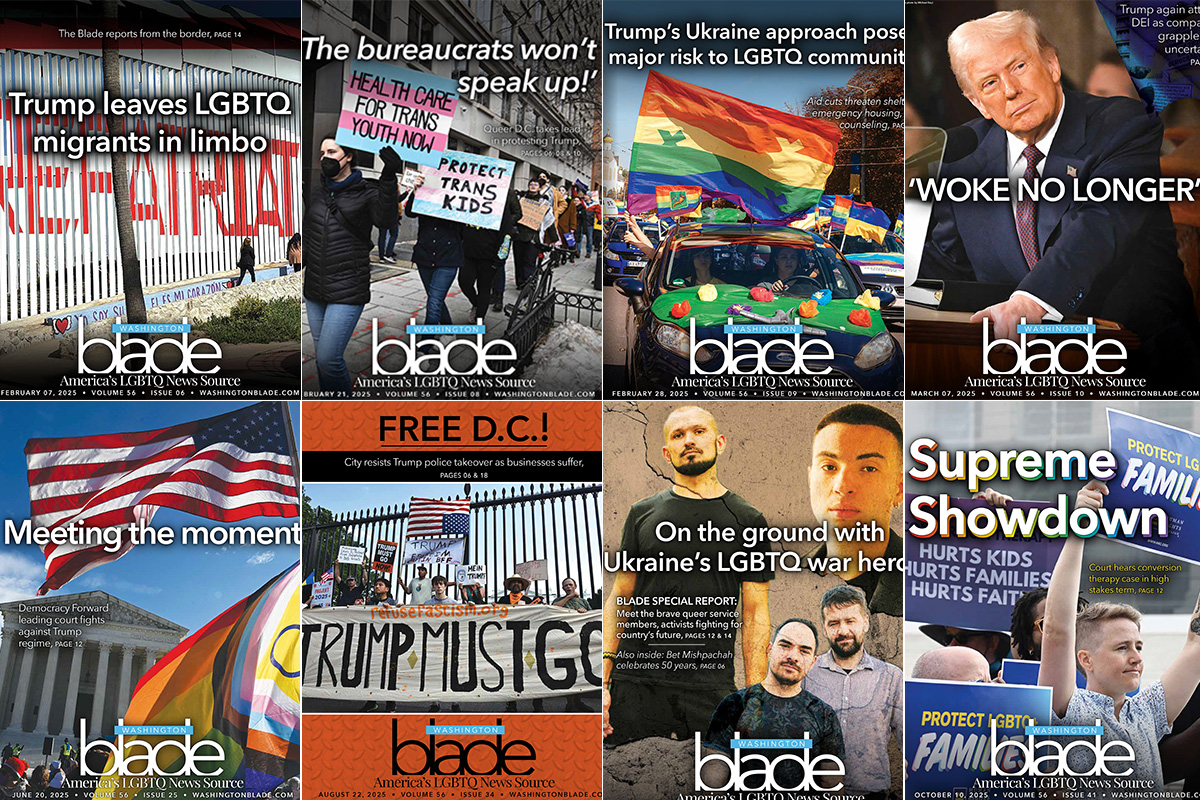
We knew it would be bad. I’m referring, of course, to 2025 and the unthinkable return of Donald Trump to the White House.
We just didn’t know how bad. The takeover of D.C. police. ICE raids and agents shooting defenseless citizens in the face. The cruel attacks on trans Americans. A compliant and complicit right-wing Supreme Court and GOP rubberstamping all the criminality and madness.
Much of that was outlined in Project 2025 and was predictable. But what has proven surprising is the speed with which major companies, powerful billionaires, and media conglomerates have hopped on board the authoritarian train and kissed Trump’s ring. Tech giants like Apple and Meta and media companies like CBS and the Washington Post have folded like cheap tents, caving to MAGA pressure and enabling Trump’s evil agenda.
The guardrails collapsed in 2025. Congress has ceded its role as a formerly co-equal branch of government. Once trusted media outlets have betrayed their audiences’ trust and morphed into propaganda arms of the White House. As a lifelong journalist, this is perhaps the most shocking and disappointing development of the past year.
The Washington Post, which adopted the ominous tagline of “Democracy Dies in Darkness,” killed its endorsement of Kamala Harris in the final days of the 2024 campaign. Same thing at the Los Angeles Times. More recently, CBS’s vaunted “60 Minutes” spiked a story critical of Trump’s immigration policies under the direction of new editor-in-chief Bari Weiss, a Trump toady and the antithesis of a journalist.
Concurrently, media companies large and small are fighting to survive. Government grants have been rescinded and the Corporation for Public Broadcasting, responsible for funding NPR and PBS, announced plans to dissolve. The Pittsburgh Post-Gazette, a nearly century-old Pulitzer Prize-winning institution, announced this week it will close on May 3. The Washington Post has lost scores of talented journalists, including prominent LGBTQ voices like Jonathan Capehart. The Baltimore Sun was acquired by the same family that owns right-wing Sinclair Broadcasting, ending a nearly 190-year tradition of award-winning, independent journalism.
It is not a coincidence that Trump’s attacks on democracy, traditions, and norms are happening while the media industry collapses. News deserts are everywhere now. In 2024, 127 newspapers closed, leaving 55 million Americans with limited or no access to local news, according to a report by Medill.
There’s a reason the media are called the “Fourth Estate.” Journalism was considered so critical to the health of our democracy that the Founding Fathers spelled it out in the First Amendment. Democracy and our Constitution cannot survive without a free and robust press.
That’s why I felt compelled to write this appeal directly to our readers. For nearly 57 years, the Blade has told the stories of LGBTQ Washington, documenting all the triumphs and heartbreaks and writing the first draft of our own history. Today, we remain hard at work, including inside the White House. This week, we have a reporter on the ground in Colombia, covering the stories of queer Venezuelan migrants amid the crisis there; another reporter will be inside the Supreme Court for next week’s trans-related cases; on Sunday, we have a reporter on the red carpet at the Golden Globes ready to interview the stars of “Heated Rivalry.”
We do a lot with a little. As major companies pull back on their support of the LGBTQ community, including their advertising in the Blade, we turn to our readers. We have never charged a dime to read the Blade in print or online. Our work remains a free and trusted resource. As we navigate these challenges, we ask that you join us. If you have the resources, please consider making a donation or purchasing a membership. If not, please subscribe to our free email newsletter. To join, visit washingtonblade.com and click on “Fund LGBTQ Journalism” in the top right navigation.
Our community is known for its resilience. At the Blade, we’ve weathered the AIDS epidemic, financial crises, and a global pandemic. We are committed to our mission and will never bend to a wannabe dictator the way so many mainstream media outlets have done. The queer press is still here and with your help we will survive these unprecedented attacks on democracy and emerge stronger than before. Thank you for reading the Blade and for considering making a donation to support our work.
Kevin Naff is editor of the Washington Blade. Reach him at [email protected].
-

 Minnesota5 days ago
Minnesota5 days agoReports say woman killed by ICE was part of LGBTQ community
-

 Maryland5 days ago
Maryland5 days agoSteny Hoyer, the longest-serving House Democrat, to retire from Congress
-

 National5 days ago
National5 days agoU.S. in midst of ‘genocidal process against trans people’: study
-

 Virginia5 days ago
Virginia5 days agoGay Va. State Sen. Ebbin resigns for role in Spanberger administration





